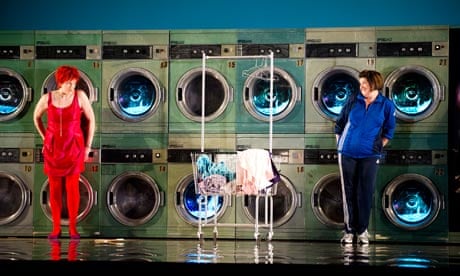Years ago, I read an Italian folk tale about a princess who, when her parents lose their money, is forced to live in poverty and make a living: weaving cloth, minding a wine store, washing clothes. Each time her luck seems to take a turn for the better, she is beset by another misfortune until eventually, through a magical stroke of luck, she gains the hand of a prince, in town to collect his laundry.
I decided to use the tale as a basis for a new opera. Called Miss Fortune, the story is about money, fate and fortune. My reworking begins with a financial crash and ends with an unlikely lottery win – yet I didn't set out to write a piece about contemporary events. I was aiming to write an urban folk tale that reminded me of everyday life, colliding with the grandeur of opera.
In 2008, as I began writing, I walked past a sandwich board bearing the headline: "Blind panic as shares crash." Right next to it was the ubiquitous fingers-crossed Lottery sign with its jaunty "Play here!" slogan. I registered a faint sense that my opera plot was already out on the street, but I didn't think all the detail it contained – the violent destruction of property, the collapse of the middle class – would soon become true as well.
At the time, I was writing a chorus number called We Didn't See It Coming. A few quotes from suddenly redundant bankers made it into the libretto ("I'm going to clear my desk"; "I'll never find another job") but soon I and my opera were pondering the wider mystery of how random the universe is, and how it often seems there's nothing we can do about it.
Miss Fortune premiered last summer at the Bregenz festival in Austria, where local audiences received it warmly despite it being performed in English. The clarity of the costume design made the characters instantly knowable, too: a stroppy teenager, a lady from a launderette, a positive-thinking businessman – these types look the same anywhere. Last month, as we reconvened in London to rehearse for this week's UK debut, conductor Paul Daniel considered the problems. How come that trumpet B-flat sounded so great in the Austrian Alps, but in London was clearly a wrong note? And did the previous orchestra really play that F-natural all last summer and we never noticed?
Meanwhile, the cast plunged into the nitty-gritty ("Four steps to the left, take the glass from Kathryn, turn …"). Despite the layoff since summer, the staging soon exuded a dance-like motion we hadn't seen before. Emma Bell, singing the title role perched five metres up on a rocky plinth, only now revealed that she was scared of heights. "But the good thing," she added, "is that I completely forget to worry about singing the music."
Since a central theme of Miss Fortune is the big part accident and chance play in life, I wanted to write a role for Fate, who emerges from the shadows whenever events take a downward or upward turn, accompanied by his own personal cloud of chaos. In London, the tricky proposition of portraying a chaotic cloud has been undertaken by Soul Mavericks, breakdancers with an amazing ability to perform hundreds of complex patterns, often in mid-air.
Meanwhile, the Chorus are a vital presence, losing all their money in the opening scene, only to reappear in increasingly direr straits. The role in Bregenz was taken up by the Prague Philharmonic Chorus, who gave touching performances while mastering illogical-looking English spellings like "rough" and "tough". But now that the Royal Opera House's chorus has taken over, the opera seems to have moved into 3D. Everyone is meaner, more downcast, more jubilant. Where these singers find the energy isn't clear: this week, they are also being wood nymphs, Spanish aristocrats and Italian peasants, in several other operas.
But this encyclopedic experience helps. Asked to fall to the ground in terror at news of an approaching financial disaster, they ask, "Like in Idomeneo?" – a reference to Mozart's great scene where people on a beach are menaced by a sea monster. Thus assured, they hurl themselves down with even greater animation.
To those who ask what material like this is doing in an opera house, I can only reply that this story allowed me to write both opera and folk music at the same time, to invent work songs for modern jobs like dry cleaning, and to find present-day uses for beautiful operatic forms, such as the aubade, or dawn song – which Hassan sings while tending his kebab van. Not something you often come across in opera.

Comments (…)
Sign in or create your Guardian account to join the discussion